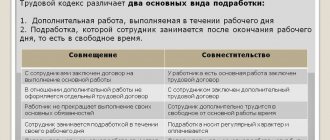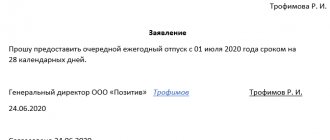The dismissal of a director is carried out for the most part on the same general grounds as ordinary employees. This issue is covered in detail in Chap. 13 Labor Code of the Russian Federation. Among other things, directors can fire:
- By agreement of the two parties (Article 78 of the Labor Code of the Russian Federation).
- At your own request (Article 80 of the Labor Code of the Russian Federation).
- For additional reasons that apply only to management (Article 278 of the Labor Code of the Russian Federation).
Thus, a contract with a director can be terminated by a decision of an authorized person (body) of the organization (clause 2 of Article 278 of the Labor Code of the Russian Federation). In this case, the reason or motivation for dismissal may not be indicated. Such dismissal is not some kind of disciplinary punishment for unlawful violations by the director. In this case, we are talking about early termination of the contract.
Regardless of the reason for dismissal, the procedure for registering it is also general and, in fact, is not much different from the dismissal of other employees. Thus, in accordance with Art. 84.1 of the Labor Code of the Russian Federation, when dismissing a director, they must:
- issue an order to terminate the employment contract;
- familiarize the dismissed person with it under his personal signature;
- immediately on the last working day (on the date of dismissal) issue the employee's work package, as well as the documents requested by him related to the work, and pay him in full,
If it is impossible to issue a work permit on the day of dismissal, then the employer sends the dismissed person a notice of the need to appear for it or give written consent to forward it. After sending such a message, the employer is released from liability for late issuance of the work permit.
The difference in the dismissal procedure is that the director is a financially responsible manager. Therefore, upon dismissal, he must also submit the act of acceptance and transfer of affairs to his successor (another authorized person).
It should also be noted that if he did not work on the day of dismissal for some reason, then the payments due to him must be made immediately after he requests payment. The deadline for payment in such circumstances is the day following the presentation of this claim. If a dispute arises between the employer and the dismissed person about the amount of payments, then the part of them that is not in dispute at that moment must be paid.
Basic rules for dismissing a director
Upon dismissal of the general director, an extraordinary meeting of company participants is convened with a summons to terminate the employment contract.
However, this issue can be raised among others at the scheduled regular or extraordinary meeting. You also need to issue an order to terminate the employment contract and familiarize the general director with it. The remaining technical stages in the process of dismissing a director are standard: making an entry in the work book and personal card, calculations, handing out the work book. There are several situations in which it is impossible to terminate an employment contract with the general director:
- if the manager is a pregnant woman, the exception is liquidation of the company (Part 1 of Article 261 of the Labor Code of the Russian Federation);
- if the manager belongs to the category of persons named in Part 4 of Art. 261 Labor Code of the Russian Federation;
- during a period of temporary disability or the director is on vacation, with the exception of liquidation of the organization (Part 6 of Article 81 of the Labor Code of the Russian Federation).
When a director cannot be fired
Secondly, according to Art. 81 of the Labor Code, it is impossible to dismiss a director, like any other employee, during vacation or temporary disability (an exception here would be the liquidation of an organization or the termination of the activities of an individual entrepreneur). Despite all the illogicality of this rule regarding the change of management body, its failure to comply entails the illegality of dismissal (clause 50 of the Resolution of the Plenum of the Supreme Court of the Russian Federation dated March 17, 2004 No. 2). This position of the Supreme Court deserves criticism, since the literal interpretation of the articles of the Labor Code does not allow dismissal to be attributed to clause 2 of Art. 278 of the Labor Code of the Russian Federation to the termination of an employment contract at the initiative of the employer, namely, these guarantees apply, and the Supreme Court allowed a broad interpretation. In practice, this creates serious problems for the owner in the event of a conflictual dismissal of a director, who only needs to have a sick leave certificate “just in case” on the date of the decision to dismiss him.
In the future, we can predict the emergence of disputes where the basis for challenging the dismissal of a manager will be based on discriminatory motives. Here, the courts will also have serious problems, but so far this kind of basis for disputes is not common in Russia.
Dismissal of a director at the initiative of the owner
Since the general director is an employee of the company, his relations with the owners are regulated by labor law. Accordingly, when dismissing a director, it is important for owners to coordinate their actions with labor legislation.
In addition, the general director is a person with whom relations are regulated by corporate law. And this should also be taken into account.
An employment contract with the general director at the initiative of the owner can be terminated due to several circumstances:
- If there is a change in the owner of the company (clause 6 of article 77 of the Labor Code of the Russian Federation). The norm does not apply to cases where the composition of participants simply changes, as well as to reorganization in the form of affiliation.
- If a transformation of society has occurred, that is, the organizational and legal form has changed (division and separation). In this case, the owners may decide that it is necessary to terminate relations with the general director without indicating the reasons for dismissal.
- If by his actions the director caused damage to the interests of society (clause 9 of article 81 of the Labor Code of the Russian Federation).
- If the director grossly violated his job duties one time (Clause 10, Article 81 of the Labor Code of the Russian Federation).
Dismissal of a director due to a change in property ownership
The new owner of the property has the right, no later than three months from the date the right of ownership arises, to terminate the employment contract with management persons.
Having decided to terminate the employment contract with the general director, the owner must pay him compensation in the amount of no less than three times the average monthly salary (Article 75 of the Labor Code of the Russian Federation).
Dismissal due to damage caused by the actions of an official
In paragraph 9 of Art. 81 of the Labor Code of the Russian Federation defines a closed list of actions that can cause damage. According to the totality of labor law norms, in this case any actions that may be grounds for termination of an employment contract with an official are recognized. But such a procedure is quite complicated, since the fact will have to be proven. In particular, it will be necessary to conduct an internal investigation, demand explanations, etc.
Auditors, external consultants who conducted an analysis of economic and financial activities, as well as employees of the company can testify to the infliction of property damage by some decision of the general director. In this situation, it will be sufficient if the employee sees in the actions of the official a violation of the interests of society and informs the employer about this in writing. Based on the message, a decision is made to order an internal audit, an order is issued to create a commission, the issues that this commission will consider, as well as the facts and circumstances that it must establish, are determined.
Upon dismissal under Art. 81 of the Labor Code of the Russian Federation, it is necessary to remember that all decisions that entail a violation of the safety of property or its unlawful use are methods of disciplinary action. Dismiss the director under clause 9, part 1, art. 81 of the Labor Code of the Russian Federation is possible if two conditions are simultaneously met:
- If the decision was made by the director unreasonably or beyond his competence, without a proper analysis of the situation, based on incomplete data, on an emotional level.
- If the decision should entail negative consequences in the form of violation of the safety of property, its unlawful use or other damage to the organization’s property (clause 48 of the Resolution of the Plenum of the Armed Forces of the Russian Federation dated March 17, 2004 No. 2).
How can the owner find out that the general director has committed a violation regarding the safety of property? One of the employees can tell him. But often owners learn about this from consultants’ reports.
Dismissal of a director due to a single gross violation of labor duties
It happens that the general director falls under the provisions of clause 10 of Art. 81 Labor Code of the Russian Federation. According to the owners, a gross violation can be any violation of duties that are named in the employment contract. For example, the director must agree on the candidacy of an acting director during his absence. If he forgot to do this, it means he grossly violated the provisions of the employment contract.
A serious violation may be considered failure to submit required reports on time or failure to meet indicators that are named in the employment contract as responsibilities. It is worth noting that clause 10, part 1, art. 81 of the Labor Code of the Russian Federation applies only to managers and deputy managers.
Since dismissal on the grounds specified in Art. 81 of the Labor Code of the Russian Federation is a disciplinary sanction, then in order to register this sanction in the work book as a basis for terminating an employment contract, the employer will have to prove the fact of a disciplinary violation. To do this, it is necessary to conduct an internal investigation.
Algorithm for conducting an internal investigation
- An official investigation can be initiated on the basis of a report, inventory results, etc.
- An order must be issued to create a commission to conduct an investigation (it indicates the names of the commission members, their positions, purpose, date of creation, validity period, powers).
- All members of the commission must familiarize themselves with the order.
- Acts and other documents are drawn up during the investigation, and a final act is prepared based on the results of the internal investigation.
- The manager must familiarize himself with the acts.
- A written explanation is taken from the manager.
- An order is issued to apply a disciplinary sanction, which the manager must familiarize himself with.
It is important to remember that two disciplinary sanctions cannot be applied for gross violations of an employment contract. You will have to decide what disciplinary action to take.
Law and comments to it
The Labor Code of the Russian Federation clearly states all the grounds on which first-level managers can be dismissed without contradicting the current Constitution, however, in addition to them, there is another part of the legislative text regulating this issue, and this time we are talking about Art. 278 of the Labor Code of the Russian Federation with comments (2017).
The dismissal of employees in accordance with this article is carried out according to three points, each of which indicates additional grounds on which the main employer can terminate an employment contract (hereinafter referred to as EA) with someone from the management of the enterprise.
Interpretation of Art. 278 Labor Code of the Russian Federation
Expert opinion
Gusev Pavel Petrovich
Lawyer with 8 years of experience. Specialization: family law. Has experience in defense in court.
So, according to the current article of the Labor Code, a boss can be dismissed from his position on the following three grounds:
- Bankruptcy. If the manager is recognized as a debtor in accordance with the Insolvency Law, the employer has the right to terminate the trade agreement with this person early.
- Making a decision on early termination of trade relations with an employee. The initiative can be taken by a legal entity of the authorized body, the property owner of an operating enterprise, as well as its authorized representative, and in all of the above cases this will not be a violation of the Constitution of the Russian Federation.
- Any other grounds specified in the TD concluded between the employee and the employer.
In addition, the contract may be terminated due to time restrictions (this happens when the term of service specified in the contract comes to an end and the owner of the organization does not want to renew it), as well as due to inconsistency of the maximum salary level of the management team, including the general director and chief accountant, average monthly earnings of enterprise employees. This basis is regulated by Article 145 of the Labor Code of the Russian Federation , which describes in detail the conditions of remuneration for managers, chief deputies and accountants, as well as budgetary (state) and extra-budgetary funds and institutions.
Analyzing all the given reasons for terminating an employment relationship with the head of a department, division or the entire enterprise, all points are clear except the second, which, at first glance, can be interpreted as the dismissal of the manager without explanation.
Article 278 has a detailed commentary for each point, a detailed familiarization with which will help to avoid unpleasant incidents when dismissing a representative of the management team. In addition, this set of current rules will help the director who is facing dismissal to defend his own rights.
Explanation of the article
A detailed commentary to Article 278 (paragraph one) indicates that a petition for settlement of a manager declared insolvent must be submitted to the appropriate state body that administers justice in any economic activity (arbitration) by the temporary manager of the organization. And if the submitted petition is satisfied by representatives of the arbitration court, then the bankrupt manager is automatically removed, and another candidate nominated by the property owner, trade union or other authorized body or person is appointed in his place.
It is noteworthy that the arbitration court can also appoint a temporary leader, that is, the last word always lies with this government body. Things will be completely different if we are talking about the dismissal of a manager under Article 278 p.
2 of the Labor Code of the Russian Federation. And first of all, this part of the legislative text covers the management of joint stock companies, the decision to dismiss whom was made at the general meeting of shareholders.
In any other labor organizations, the issue of dismissal, and even more so the decision on it, can only be considered by authorized bodies and their individual representatives. For example, the federal legislator can influence the early termination of a TD if a manager fails to fulfill the obligations assigned to him, which are described in detail in Article 53 of the Civil Code of the Russian Federation.
That is, we are talking about special grounds established by the authorized body, which will not constitute a violation of the Constitution.
It should be noted that the federal legislature will not consider the early termination of a TD unless the employer provides a reason why it decided to terminate the management employee.
The same can be said about the decision to dismiss a manager due to his inaction or commission of some guilty actions, because in both cases, termination of the contract must be justified by citing specific facts about violations.
The second paragraph of the article also “floats” on a number of other issues. For example, an employer can easily fire his manager if his company goes bankrupt, ceases its activities, changes the strategic goal of development, decides to increase the level of the management team, etc., despite the fact that this list can be continued almost endlessly (in other words, : “The owner is a gentleman”).
However, despite such a broad interpretation of Article 278 (clause 2) of the Labor Code of the Russian Federation with comments, the state took care to prevent the development of potential lawlessness on the ground.
Dismissal of a manager on the basis of Art. 278 Labor Code of the Russian Federation
1. Situation No. 1: The company is introducing bankruptcy proceedings (clause 1 of Article 278 of the Labor Code of the Russian Federation)
The decision to remove the manager from office in this case is made by the arbitration court. The following may apply for the removal of the head of a debtor organization from office: a temporary manager, a meeting of creditors, an administrative manager, or persons who provided security.
Key points for this situation:
- The basis for issuing the order is the ruling of the arbitration court on the removal of the head of the organization from office.
- The last day of work is the day when the owner of the organization’s property became aware of the entry into force of the court’s ruling.
- The director is not paid severance pay (with the exception of cases where such payment is provided for in an employment contract or other local regulatory act of the organization).
2. Situation No. 2: The authorized body of the legal entity decided to terminate the contract (clause 2 of Article 278 of the Labor Code of the Russian Federation)
An employment contract with a director may be terminated by a general meeting of shareholders or the board of directors. Dismissal of the head of the organization on the basis established in clause 2, part 1, art. 278 of the Labor Code of the Russian Federation, can happen at any time and without specifying motives.
Registration scheme using the example of dismissal of the general director of an LLC at his own request
In part, this process, as with the dismissal of an ordinary employee, comes down to agreeing on the decision to dismiss, recording it properly in the administrative document, the work book of the dismissed person, as well as issuing a calculation.
But, since we are still talking not about an ordinary employee, but about the general director, the typical dismissal scheme acquires new components. Thus, the founders take part in making decisions and actually formalizing the dismissal. And their final decision requires making appropriate changes to the Unified State Register of Legal Entities. The procedure for entering information about dismissal in the work book is also somewhat different.
| Key stages of the dismissal procedure | What is included |
| Holding an extraordinary general meeting of participants after writing a letter of resignation | 1. The issue of dismissal is discussed.2. A protocol is drawn up (indicating the last day of work of the dismissed person and the appointment of a new general director or an interim director). |
| Transfer of affairs from the dismissed manager to the company | The resigning general director must provide the LLC with documentation stamped on the executed deed |
| Mark in the work book of the dismissed general director on the final day of work | This mark must contain: · the reason for the resignation with reference to an article of the Labor Code of the Russian Federation (in the case under consideration - clause 3, part 1, article 77 of the Labor Code of the Russian Federation); · Protocol number and date (or an order, i.e. a document including a decision on dismissal); · signature of the responsible person (his capacity may be the chairman of the meeting, the head of the board of directors, an appointed member of the LLC, the sole founder - the general director); · seal |
| Free legal consultation We will answer your question in 5 minutes! Ask a Question Free legal consultation We will answer your question in 5 minutes! Ask a Question Making changes to the Unified State Register of Legal Entities | For this purpose, a prepared application in format P14001 is submitted to the Federal Tax Service (Federal Tax Order No. ММВ-7-6 / [email protected] dated January 25, 2012); until new data is entered into the Unified State Register of Legal Entities, the previous director remains active |
The final payment to the general director is made as standard on the day of dismissal. The payment includes: salary due, compensation for unused annual leave, benefits (if applicable).
Dismissal at the initiative of the General Director
The manager has the right to terminate the employment contract early, but he must notify all owners of his intention to resign, in writing and no later than one month in advance (Article 280 of the Labor Code of the Russian Federation). Letters are sent to all founders, owners, shareholders according to the register, with notification of delivery. In the letters, the director asks to convene an extraordinary meeting with a summons to terminate the employment contract. The procedure for transferring affairs and property is determined in advance so that the owner does not initiate arbitration processes.
If a manager resigns at his own request, he is not paid monetary compensation in an amount not less than three times his average monthly salary.
Insurance premiums.
By virtue of paragraphs. 2 p. 1 art. 422 of the Tax Code of the Russian Federation are not subject to insurance premiums for all types of compensation payments established by the legislation of the Russian Federation, legislative acts of the constituent entities of the Russian Federation, decisions of representative bodies of local self-government (within the limits established in accordance with the legislation of the Russian Federation) related to the dismissal of employees, with the exception of:
- compensation for unused vacation;
- the amount of payments in the form of severance pay and average monthly earnings for the period of employment in the part exceeding in general three times the average monthly earnings or six times the average monthly earnings for workers dismissed from organizations located in the Far North and equivalent areas;
- compensation to the manager, deputy managers and chief accountant of the organization in a portion exceeding three times the average monthly salary.
A similar exemption applies to the taxation of these payments with contributions for compulsory social insurance against accidents at work and occupational diseases (see paragraph 2, paragraph 1, article 20.2 of the Federal Law of July 24, 1998 No. 125-FZ “On compulsory social insurance against accidents” cases at work and occupational diseases").
Consequently, compensation paid to the head of an organization upon dismissal is exempt from insurance premiums in an amount not exceeding, in general, three times the average monthly salary. If compensation exceeds this amount, then insurance premiums must be calculated from the excess amount.
Confirmation from the Ministry of Finance can be found in Letter dated 10/08/2018 No. 03‑15‑06/72219. Compensation payments related to the dismissal of the head, deputy head and chief accountant of organizations located in the regions of the Far North and equivalent areas, in the cases specified in Art. 181 and 279 of the Labor Code of the Russian Federation are exempt from insurance contributions in an amount not exceeding in general three times the average monthly earnings of these persons. Amounts of these payments exceeding three times the average monthly earnings are subject to insurance premiums in accordance with the generally established procedure.
Dismissal of the director due to the expiration of the employment contract
Since the executive body is appointed for three or five years, the powers of the director may be terminated due to the expiration of the contract. In this situation, dismissal is carried out in the general manner - the same as in the case of ordinary employees. However, the director must be warned by the employer (company owner) no later than three days before the expiration of the employment contract.
The employer sends the employee a corresponding notice, which is signed by him or an authorized person (for example, the head of the human resources department).
Next, a dismissal order is issued, a corresponding entry is made in the work book (Part 4 of Article 66 of the Labor Code of the Russian Federation) and a calculation is made.
Features of registration of entries in the Work Book
Taking into account the level of official position, it will be necessary to observe certain features of entering data about the changed status of the general director in his work book. They are entered in the standard mode , except for the information entered in column 4 of this document.
It indicates the decision made by the founder, with the obligatory entry of information about the number of the protocol drawn up , if one was drawn up, or any other justification for the reasons for dismissal, confirmed by the seal of the organization. This procedure was approved in 2009 by letter No. 1143-TZ of the country's Rostrud.
An example of making an entry in the work book about the dismissal of the general director.
What guarantees can a director count on upon dismissal?
First of all, compensation is provided in the form of three times the average monthly earnings (Article 279 of the Labor Code of the Russian Federation). However, as noted above, there are cases when this compensation is not paid - upon dismissal as a result of bankruptcy of a legal entity, upon expiration of the contract and at the request of the employee.
Compensation must be paid if the owner of the organization’s property changes (Article 181 of the Labor Code of the Russian Federation). At the same time, simply a change of company participants does not constitute a change of property owners.
Common mistakes when settling accounts with a dismissed director
Error 1. Even if the employment agreement concluded with the director does not stipulate the payment of compensation upon dismissal, it must still be paid under the conditions provided for by the Labor Code of the Russian Federation. This means that it can be paid under these circumstances only if the basis for dismissal is an agreement of the parties.
If a director is dismissed at his own request, compensation is paid only when stipulated in the employment agreement.
Error 2. Payments to the dismissed person are made out of turn, i.e. not on the day of payment of the salary (advance), but on the day of his dismissal. This standard applies to all categories of employees, including managers.
Responsibility of the former manager
Does the former CEO's liability continue after his official dismissal? A feature of a position of this level is the guaranteed preservation of the right to call a citizen who held the post of general director to administrative and criminal liability .
In particular, he retains financial liability in the event of proof of unlawful actions. Such as:
- expenses or lost profits that occurred due to the fault of this employee;
- identified loss or damage to property.
Administrative claims on this basis can be considered at any time period upon proof of the identified fact, confirmed during the court hearing.
Such a resigned employee may be held criminally liable on the basis of Article 165 of the country’s Criminal Code, which deals with situations of causing property damage through deception or breach of trust .
The period for bringing to criminal liability is determined by the statute of limitations under the article of the Criminal Code.
On our website you can also find out about:
- What disciplinary sanctions can be applied to an employee?
- How to conclude an employment contract with the commercial and executive director of an LLC?
- How can a participant leave an LLC?
- What are the features of an urgent TD with the director of an LLC?
- How is a director fired?
- Do you need an accountant for an individual entrepreneur?
- How is the organization managed?










